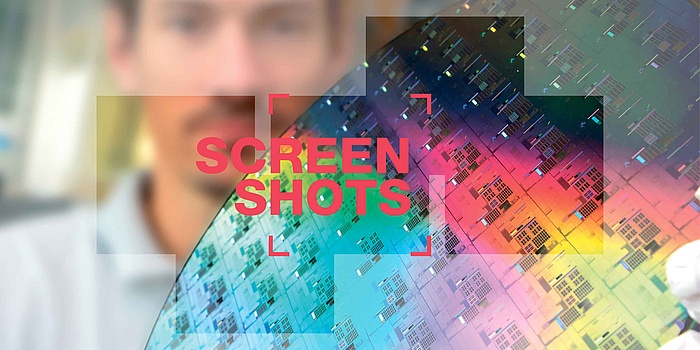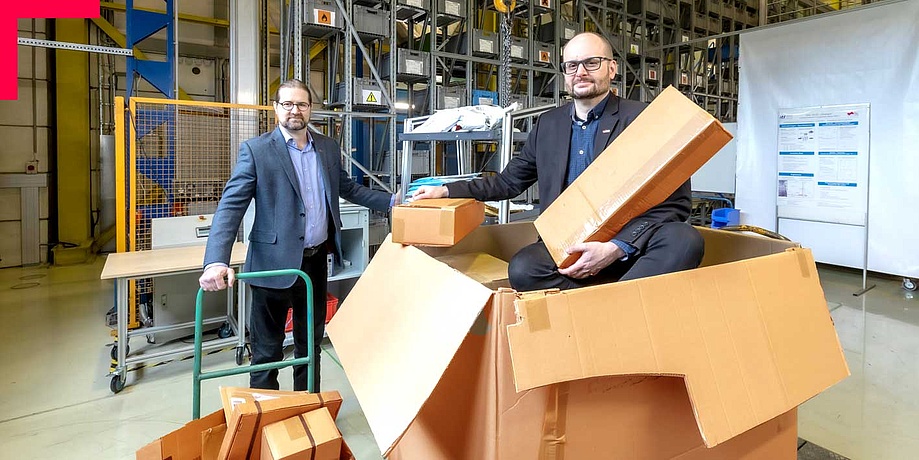Pizza delivery time more than an hour? The likelihood of us ordering from this pizzeria is vanishingly small when there are five other pizzerias where the delivery service only takes 40 minutes. When tummies rumble, things have to move fast. But hunger for fast deliveries is not limited to pizza and sushi, etc. Christian Landschützer from the Institute of Logistics Engineering at TU Graz: "We're used to getting everything we want delivered as quickly as we possibly can. And if the retailers don't offer that, we order elsewhere. On the other hand, almost half of the transport trips are empty. They all have their own logistics, which is anything but efficient."
As with many machines, the same is true in logistics: things run best under full load. Mario Hirz from the Institute of Automotive Engineering is convinced that this requires cooperation. "The fact that different dealers operate their own trucks is far from ideal. It leads to high environmental pollution and high CO2 emissions. The transportation of goods and commodities – compared to other expenses – is very cheap. Shipping a container from overseas, for example, doesn't even cost 5,000 euros." New legal frameworks could help optimize the use of resources. Hirz and Landschützer are also convinced that new approaches to solutions need to be developed. The two see their team's research as an important contribution to more sustainable logistics. "We provide approaches that show it can be done differently."
Not at all on the wrong track
The approaches are promising. One major project is the flagship project PhysICAL coordinated by Fraunhofer Austria (funded by the climate protection ministry). TU Graz is a cooperation partner in this project. The focus is on the physical internet. On the internet, data is packaged uniformly and sent around the world in open networks. It could also work like this with real goods. For example, not every grocery store would have its own logistics network with its own lorries. Everyone would use a common logistics system.
One of the approaches the research team is pursuing is an open goods exchange system. This can be used by all delivery services. In Graz, a city hub is being installed for this purpose. This is used to carry out digitally optimized route planning from a single source for all transport companies involved. Another pilot project in the context of PhysICAL deals with timber transport in the upper Mur valley. Instead of countless trucks currently transporting the wood, the wood will be loaded onto cooperatively used containers. Around one third of the transport volume is shifted from road to rail.
How sustainable is autonomous driving?
Another approach is that of autonomous driving. Autonomous vehicles have great potential to revolutionize the transportation of people and goods. In federal states like California, this technology is being used on public roads, Hirz reports. "There are already companies there which carry out autonomous delivery on public roads. Very soon we will see this in Europe as well." At TU Graz, a joint team from the Institute of Software Technology and the Institute of Automotive Engineering is working on this topic. Autonomous delivery has already been tested in the Graz inner city. When it comes to sustainability, however, Hirz is sceptical about autonomous driving: "It makes delivery more efficient and easier. But that doesn't necessarily mean less traffic. Again, you have to balance economic and environmental interests as best you can."
Expanding horizons
Landschützer and Hirz are convinced that interdisciplinary teams are needed in research: "Logistics doesn't work without vehicle technology, digitalization and business management. It all has to go hand in hand." In order to take even greater account of this interconnectedness, a "research initiative for sustainable passenger and freight mobility" has been established at TU Graz. This combines nine doctoral theses at eight institutes. All of them deal with issues related to sustainable mobility. Two examples: doctoral student Thu Trang Nguyen is evaluating technologies and transportation systems for their impact on global warming. Doctoral student Florian Ratz is developing new business models for sustainable passenger and freight transport.
The focus is on interdisciplinary networking. Hirz and Landschützer see this as an important prerequisite for more climate-friendly and efficient logistics. "One of the big questions going forward will continue to be: how can I get a delivery to the customer in the most environmentally friendly, convenient and cost-effective way possible? Here, I can only find solutions if I, as a researcher, expand my horizons. I have to understand other disciplines. We want to do our part. Students should carry this knowledge and mindset into the companies after their training."
Studying at TU Graz: TU Graz offers a wide range of courses in engineering. They range from mechanical and civil engineering to electrical engineering. These can also be taken in combination with economics. There is also a Master’s programme in Production Science and Management, which is held in English.
At the interface of electrical engineering, mechanical engineering and computer science, TU Graz is also offering the new Bachelor’s programme in Digital Engineering starting in autumn. In the Master's programme in Information and Computer Engineering, students acquire com-bined knowledge in computer science and electrical engineering and have a wide range of specialization options.
For more information, go to the overview "Degree and Certificate Programmes" on the TU Graz website.
Flying carpet for packages
Österreichische Post (the Austrian postal service) delivered 30 percent more parcels in 2020 than in the previous year. Innovative logistics technologies are needed to make delivery more efficient and reduce the workload of employees. In doing so, know-how at TU Graz is relied on time and again. For this reason, the postal service also holds a stake in the Styrian start-up PHS Logistiktechnik GmbH. With its "rapid unloader” product, this company speeds up the unloading of trucks by 75 per cent. PHS is a spin-off of TU Graz. It is managed by Andreas Wolfschluckner and Matthias Fritz. Before becoming self-employed, both conducted research at the Institute of Logistics Engineering.
PHS developed an unloading system with a so-called "dock-and-go solution". The system consists of a roll-up load carrier. This is placed in the lorry. There is also a stationary device at the gate of the warehouse where the packages are to be brought. The stationary device is connected to the roll-up load carrier in the truck, and pulls out the packages and transfers them individually to the respective launching lines. Thanks to the smart rapid unloading system, the speed of unloading is 75 per cent faster than with manual unloading. But that's not all. PHS is currently developing the technology even further to become even more efficient and thus more environmentally friendly.

Researchers at TU Graz are looking for solutions to the burning problems of the present. What topics are currently on their radars and what you can study to change the future, you can find out on TU Graz screenshots.
